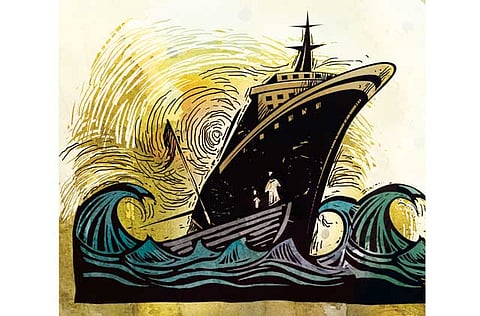Arab initiative essential to end Somali piracy
Countries in the region need to play a stronger role to limit the involvement of blue water navies of other countries

Recurring piracy off the Somali coast has attracted worldwide attention in the last three years, but the Somali case is just one example of a global problem (even if it is the most glaring), and the frequency of the attacks highlights the vulnerability of the sea routes which are vital for world trade.
The International Maritime Bureau reports that from January to September 2010, there were 126 attacks off Somalia, compared to 85 in Southeast Asia, 25 near the Americas, 22 off the Indian subcontinent, and 11 from Nigeria.
The same figures in 2009 were 217 in Somalia, 67 in southeast Asia, 37 in the Americas, 29 off the Indian subcontinent, and 28 in Nigeria. Somalia leads the way by some distance, and the fate of the pirates in Southeast Asia points to some ways in which the world and the Arab region might prepare to deal with the Somalis.
Sam Bateman, writing on piracy in the authoritative Korean-based magazine, Global Asia, there are two hotspots in Southeast Asian waters around Indonesia, Vietnam and the Philippines: the southern part of the South China Sea, and the eastern part of the Singapore Straits. A former hotspot, the Malacca Strait is now much better due to better policing.
As Bateman points out, most insurance policies cover the entire period a ship is held for ransom, and "the direct costs to the shipping industry are not great in the greater scheme of things. The number of ships attacked is small relative to the number of ships passing through risky areas."
The success in cutting piracy in the Malacca Strait relied on more effective policing of the waters, and the Indonesian government is currently working on improving its surveillance of the South China Sea, intending to bring pressure to bear on the pirates there. These cases show that piracy can be beaten, but it requires firm action.
The lessons from Asia are hard to import to Somalia, since they depend on an effective government being able to take the initiative. Shipping from Somalia's Arab neighbours has been badly affected by Somali piracy, but there has been no Arab move to take the initiative.
A few states have sent navy vessels to join the loosely coordinated international force, but this has not led to much as they are unable to act on the disastrous state of chaos in Somalia itself, which allows the pirates to operate without threat from any government.
But despite the on-land task being beyond much hope of improvement, several governments have ordered their navies to take a more vigorous stance. The South Koreans recently recaptured a ship which had left Dubai with a cargo heading east, and the Malaysians have carried out a similar operation, as have the Indians and Chinese in the past. This is in contrast to the European Union forces which have been ordered not to attack the pirates for fear of injuring their hostages.
None of these governments is talking very much about what their naval forces are up to in the Gulf of Aden and Arabian Sea, and maybe they have good security reasons for staying quiet. But it is obvious that the South Korean, Malaysian, Indian and Chinese navies have sent ships to the region, well armed and with the right forces on board to act against the pirates. The Somali coast is very far from their normal areas of concern, and it is dramatic illustration of how countries are able to project force over thousands of miles.
American and Indian concerns over China's wider maritime interests, and greatly expanding blue water navy, are brought into sharper focus by these kinds of incidents, which prove that it is not just the Chinese who can move force around the world and use it to great effect.
Major maritime hub
The UAE, and Dubai in particular, is a major maritime hub, and thousands of cargo ships pass through its ports. It has a direct interest in seeing the Somali pirates dealt with, however exhausting the task might be.
The intractability of finding a political solution to Somalia's long running chaos has understandably put all its Arab neighbours off trying to help, but that does not mean that the problem has gone away. The pirates are only one very disturbing outcome of having a totally failed state in the region. Active bases for terrorists are another.
But the answer is not to leave the solution to Asian navies operating on their own. A more coordinated and active policy is required, and the Arab states should take a stronger role. They have the naval forces available and potentially considerably more local knowledge than the Asian navies, and also the EU and American forces in the region.
It is understandable if merchant seamen say that they do not want to be armed, since if they do not shoot back at pirates, their lives are vastly more safe. Their owners may be inclined to take the same route, arguing for the safety of their ships and crews, and so may not want to put tough security men on board their ships.
But the navies of the region and the anti-piracy forces do not have this choice. The job of government is to enforce security, and even when a government has collapsed, they have to act.
Sign up for the Daily Briefing
Get the latest news and updates straight to your inbox



